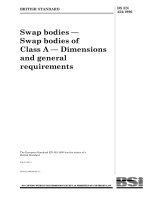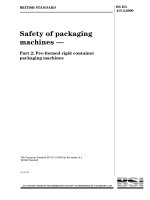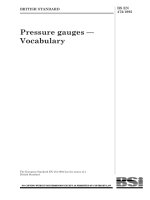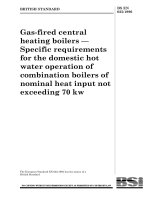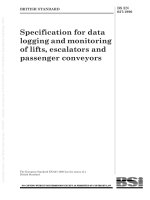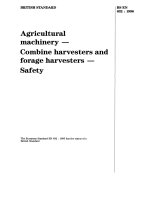Bsi bs en 61297 1996 (2000)
Bạn đang xem bản rút gọn của tài liệu. Xem và tải ngay bản đầy đủ của tài liệu tại đây (432.17 KB, 10 trang )
BRITISH STANDARD
Industrial-process
control systems —
Classification of
adaptive controllers for
the purpose of
evaluation
The European Standard EN 61297:1995 has the status of a
British Standard
ICS 25.040.40; 35.240.50
BS EN
61297:1996
IEC 1297:1995
BS EN 61297:1996
Committees responsible for this
British Standard
The preparation of this British Standard was entrusted by Technical
Committee GEL/65, Measurement and control, upon which the following
bodies were represented:
British Coal Corporation
British Gas plc
British Nuclear Fuels plc
Electrical Contractors’ Association
Electricity Association
Energy Industries Council
GAMBICA (BEAMA Ltd.)
Health and Safety Executive
Institution of Gas Engineers
The following bodies were also represented in the drafting of the standard,
through subcommittees and panels:
British Pressure Gauge Manufacturers’ Association
Department of Trade and Industry (National Engineering Laboratory)
Department of Trade and Industry (Services Management Division)
Engineering Industries Association
Institute of Materials
Institution of Electrical Engineers
This British Standard, having
been prepared under the
direction of the
Electrotechnical Sector
Board, was published under
the authority of the
Standards Board and
comes into effect on
15 June 1996
© BSI 01-2000
The following BSI references
relate to the work on this
standard:
Committee reference GEL/65
Draft for comment 90/28883 DC
ISBN 0 580 25671 5
Amendments issued since publication
Amd. No.
Date
Comments
BS EN 61297:1996
Contents
Committees responsible
National foreword
Foreword
Text of EN 61297
© BSI 01-2000
Page
Inside front cover
ii
2
3
i
BS EN 61297:1996
National foreword
This British Standard has been prepared by Technical Committee GEL/65 and is
the English language version of EN 61297:1995 Industrial-process control
systems — Classification of adaptive controllers for the purpose of evaluation,
published by the European Committee for Electrotechnical Standardization
(CENELEC). It is identical with IEC 1297:1995 published by the International
Electrotechnical Commission (IEC).
A British Standard does not purport to include all the necessary provisions of a
contract. Users of British Standards are responsible for their correct application.
Compliance with a British Standard does not of itself confer immunity
from legal obligations.
Summary of pages
This document comprises a front cover, an inside front cover, pages i and ii,
the EN title page, pages 2 to 5 and a back cover.
This standard has been updated (see copyright date) and may have had
amendments incorporated. This will be indicated in the amendment table on the
inside front cover.
ii
© BSI 01-2000
EN 61297
EUROPEAN STANDARD
NORME EUROPÉENNE
EUROPÄISCHE NORM
October 1995
ICS 33.020
Descriptors: Control system, industrial-process, adaptive controller, classification, evaluation
English version
Industrial-process control systems
Classification of adaptive controllers
for the purpose of evaluation
(IEC 1297:1995)
Systèmes de commande des processus
industriels
Classification des régulateurs adaptatifs en
vue de leur évaluation
(CEI 1297:1995)
Industrielle Prozeßleitsysteme
Klassifikation von adaptiven Reglern
(IEC 1297:1995)
This European Standard was approved by CENELEC on 1995-09-20.
CENELEC members are bound to comply with the CEN/CENELEC Internal
Regulations which stipulate the conditions for giving this European Standard
the status of a national standard without any alteration.
Up-to-date lists and bibliographical references concerning such national
standards may be obtained on application to the Central Secretariat or to any
CENELEC member.
This European Standard exists in three official versions (English, French,
German). A version in any other language made by translation under the
responsibility of a CENELEC member into its own language and notified to the
Central Secretariat has the same status as the official versions.
CENELEC members are the national electrotechnical committees of Austria,
Belgium, Denmark, Finland, France, Germany, Greece, Iceland, Ireland, Italy,
Luxembourg, Netherlands, Norway, Portugal, Spain, Sweden, Switzerland and
United Kingdom.
CENELEC
European Committee for Electrotechnical Standardization
Comité Européen de Normalisation Electrotechnique
Europäisches Komitee für Elektrotechnische Normung
Central Secretariat: rue de Stassart 35, B-1050 Brussels
© 1995 Copyright reserved to CENELEC members
Ref. No. EN 61297:1995 E
EN 61297:1995
Foreword
Contents
The text of document 65B/226/DIS, future edition 1
of IEC 1297, prepared by SC 65B, Devices, of
IEC TC 65, Industrial-process measurement and
control, was submitted to the IEC-CENELEC
parallel vote and was approved by CENELEC as
EN 61297 on 1995-09-20.
The following dates were fixed:
— latest date by which the EN
has to be implemented at
national level by publication
of an identical national
standard or by endorsement (dop) 1996-07-01
— latest date by which the
national standards
conflicting with the EN
have to be withdrawn
(dow) 1996-07-01
Page
Foreword
2
1
Scope
3
2
Classification of methods of adaptation
3
2.1 Main categories
3
2.2 Self-adaptive controllers
3
2.3 Fixed dependency adaptive controllers
3
3
Terminology for self-adaptive controllers
3
4
Terminology for controllers with fixed
dependency adaptation
4
5
Terminology for the description of the
adaptation process
4
6
Summary of terms
5
Figure 1 — Classification of adaptation methods 3
Figure 2 — Terms for self-adaptive controllers 4
Figure 3 — Terms for controllers with
fixed dependency adaptation
4
Figure 4 — Additional definitions for the
description of the adaptation
5
Figure 5 — Terms for adaptive controllers
5
2
© BSI 01-2000
EN 61297:1995
1 Scope
This International Standard classifies and defines
the terms to be used in describing the different types
of adaptive controller. The classifications described
are logically a complete series, although it is quite
possible that no controller will be available in some
of the categories described. However, many
controllers will be classified under more than one
category described in this standard.
2 Classification of methods of
adaptation
2.1 Main categories
Adaptive controllers are classified into two main
categories, by virtue of the type of adaptation which
their design incorporates. These are defined below
in 2.2 and 2.3 , and shown in Figure 1.
This classification is based on the practical concept
of whether the controller is able to optimize itself
automatically, or whether the operator has to set in
the optimization strategy based on his experience of
the process characteristics.
2.2 Self-adaptive controllers
Controllers are described as self-adaptive when
some of their control characteristics can be adjusted
automatically, either on demand or continuously, in
order to achieve a specified response of the control
loop.
2.3 Fixed dependency adaptive controllers
The adaptation is described as fixed dependency
adaptation when the optimization of the controller
is based on prescribed changes in the controller
characteristics based on the measured process
characteristics (process model).
3 Terminology for self-adaptive
controllers
The names given to the different types of
self-adaptive controllers relate to the manner in
which the adaptation is implemented. This depends
on whether it is the controller parameters, the
controller structure, or the input signals to the
controller which are influenced by the adaptation
(see Figure 2).
3.1
self-tuning on demand
a controller is of this type when the adaptation to
optimize the controller parameters is initiated on
demand from the operator
3.2
continuously self-tuning
a controller is of this type when the adaptation to
optimize the controller parameters is a continuous
process
3.3
structure adaptive controllers
a controller is of this type when the structure of the
controller is modified by the adaptation process, for
example P-PI-switchover
3.4
signal adaptive controller
a controller is of this type when the adaptation
process influences the input signal to the controller,
for example by modifying the characteristics of some
input filters
NOTE Many self-adaptive controllers are of the “self-tuning on
demand” or “continuously self-tuning” types.
Figure 1 — Classification of adaptation methods
© BSI 01-2000
3
EN 61297:1995
Figure 2 — Terms for self-adaptive controllers
4 Terminology for controllers with
fixed dependency adaptation
4.3
controller with signal scheduling
The names given to the different types of fixed
dependency adaptation controllers relate to the
controller characteristics by which the adaptation is
implemented (see Figure 3).
a controller is of this type when the fixed
dependency adaptation process influences the input
signal to the controller, for example by modifying
the characteristics of some input filters
a controller is of this type when the controller
parameters are modified by the fixed dependency
adaptation process
5.1
controller type
4.1
controllers with parameter scheduling
4.2
controller with structure scheduling
a controller is of this type when the structure of the
controller is modified by the fixed dependency
adaptation process, for example P-PI-switchover
5 Terminology for the description of
the adaptation process
the name of the adaptive controller also contains the
term for the applied control algorithm, for example
PID, state-space controller, etc.
Figure 3 — Terms for controllers with fixed dependency adaptation
4
© BSI 01-2000
EN 61297:1995
5.2
adaptation method
the adaptation is described as direct if the controller
is influenced directly by the adaptation, without
generating explicitly a process model. Otherwise the
adaptation is described as indirect. The adaptation
is called deterministic (or stochastic) if the quality
criterion is deterministic (stochastic) (see Figure 4)
6 Summary of terms
A summary of the relationship between the above
terms relating to the adaptive controllers is shown
diagrammatically in Figure 5.
Figure 4 — Additional definitions for the
description of the adaptation
Figure 5 — Terms for adaptive controllers
© BSI 01-2000
5
BS EN
61297:1996
IEC 1297:1995
BSI — British Standards Institution
BSI is the independent national body responsible for preparing
British Standards. It presents the UK view on standards in Europe and at the
international level. It is incorporated by Royal Charter.
Revisions
British Standards are updated by amendment or revision. Users of
British Standards should make sure that they possess the latest amendments or
editions.
It is the constant aim of BSI to improve the quality of our products and services.
We would be grateful if anyone finding an inaccuracy or ambiguity while using
this British Standard would inform the Secretary of the technical committee
responsible, the identity of which can be found on the inside front cover.
Tel: 020 8996 9000. Fax: 020 8996 7400.
BSI offers members an individual updating service called PLUS which ensures
that subscribers automatically receive the latest editions of standards.
Buying standards
Orders for all BSI, international and foreign standards publications should be
addressed to Customer Services. Tel: 020 8996 9001. Fax: 020 8996 7001.
In response to orders for international standards, it is BSI policy to supply the
BSI implementation of those that have been published as British Standards,
unless otherwise requested.
Information on standards
BSI provides a wide range of information on national, European and
international standards through its Library and its Technical Help to Exporters
Service. Various BSI electronic information services are also available which give
details on all its products and services. Contact the Information Centre.
Tel: 020 8996 7111. Fax: 020 8996 7048.
Subscribing members of BSI are kept up to date with standards developments
and receive substantial discounts on the purchase price of standards. For details
of these and other benefits contact Membership Administration.
Tel: 020 8996 7002. Fax: 020 8996 7001.
Copyright
Copyright subsists in all BSI publications. BSI also holds the copyright, in the
UK, of the publications of the international standardization bodies. Except as
permitted under the Copyright, Designs and Patents Act 1988 no extract may be
reproduced, stored in a retrieval system or transmitted in any form or by any
means – electronic, photocopying, recording or otherwise – without prior written
permission from BSI.
This does not preclude the free use, in the course of implementing the standard,
of necessary details such as symbols, and size, type or grade designations. If these
details are to be used for any other purpose than implementation then the prior
written permission of BSI must be obtained.
BSI
389 Chiswick High Road
London
W4 4AL
If permission is granted, the terms may include royalty payments or a licensing
agreement. Details and advice can be obtained from the Copyright Manager.
Tel: 020 8996 7070.
